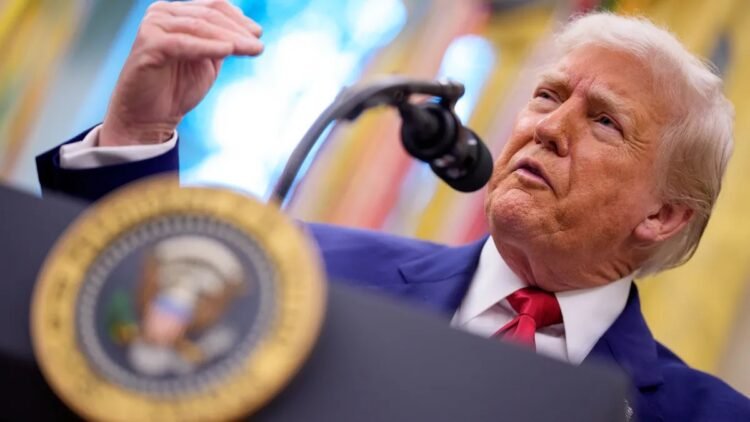WASHINGTON — U.S. President Donald Trump is pushing back against growing criticism that his signature trade tactics reflect not strength, but retreat. The term “TACO,” short for “Trump Always Chickens Out,” is gaining traction among financial analysts to describe his pattern of bold tariff threats followed by swift pullbacks — a style he insists is pure negotiation.
The phrase, popularized by Financial Times columnist Robert Armstrong, reflects a broader sentiment in financial circles: Trump tends to rattle global markets with aggressive tariff declarations, only to dial them back under pressure. Markets often react with sharp drops, followed by modest recoveries once the president softens his stance.
On Wednesday, confronted with the term during an Oval Office press briefing, Trump scoffed at the idea that his behavior constitutes weakness. “You call that chickening out?” he said. “It’s called negotiation.”
Citing his own 1987 book The Art of the Deal, Trump defended his approach: “I set a ridiculous high number and I go down a little bit — you know, a little bit.”
The president then pivoted to a familiar line of rhetoric, painting the U.S. economy as having been “stone-cold dead” before his administration’s policies allegedly revived it. “And you ask a nasty question like that,” he added, visibly irritated.
Critics point to several recent examples that feed the “TACO” narrative: a proposed 145% tariff on Chinese goods was quickly reduced to 30% for a 90-day negotiation window; a threat of 50% tariffs on European Union imports was postponed until July 9, though a 10% duty remains. Trump argues these threats have pushed foreign governments to the bargaining table.
“We wouldn’t be negotiating with the EU at all if it weren’t for the tariffs,” he said.
This pattern extends beyond China and Europe. In early April, the president announced universal electronics tariffs based on bilateral trade deficits, only to later modify the plan — another move that stirred global market turmoil.
Despite the volatility, Trump claims the U.S. has seen a $14 trillion surge in new investments during his tenure — a figure economists say lacks independent verification and may be exaggerated.
“We have $14 trillion now invested… when Biden didn’t have practically anything,” Trump declared. “This country was dying. Now we’re the hottest in the world. I went to Saudi Arabia, the king told me.”
As of midweek, the S&P 500 was slightly up for the year, but still down 15% from the previous year, underscoring the volatility tied to Trump’s unpredictable trade agenda.
Whether the “TACO” label sticks or is replaced with another Trumpism remains to be seen. For now, investors, allies, and rivals are left navigating the consequences of a negotiation style that veers between hardline and hesitant — sometimes in the same breath.

 English
English



























































